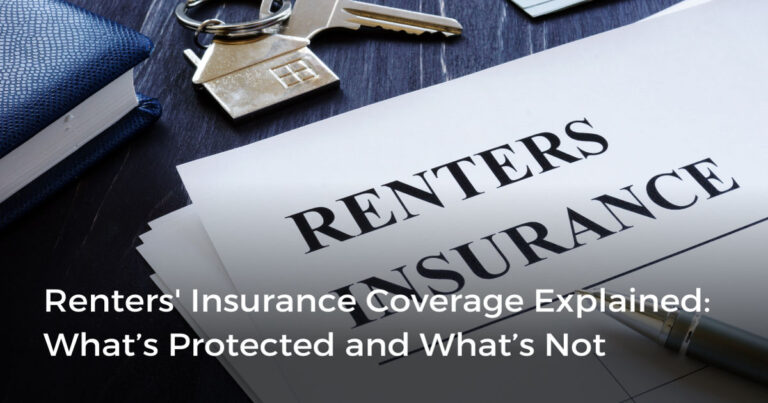Renters’ insurance might not be required by law, but it’s one of the best investments you can make to protect yourself and your belongings. If you’re a first-time renter, you might be wondering: Do I need renters’ insurance? The answer is yes, especially if you care about your laptop, furniture, or even just having a place to stay if disaster strikes. For as little as $8 a month, renters’ insurance offers protection that can save you thousands.
Here is a breakdown on what renters’ insurance covers, what it doesn’t, and why it’s a must-have before you sign that lease.
What Is Renters’ Insurance and Why Should You Care?
Renters’ insurance is a policy designed to protect tenants. It covers your items, provides liability protection, and helps with temporary housing if your rental becomes uninhabitable. While landlords have insurance for the building itself, that coverage doesn’t extend to your belongings inside it. That’s where renters’ insurance comes in.
It’s especially useful for students, young professionals, or anyone renting for the first time who might not have a financial safety net if something unexpected happens.
What Renters’ Insurance Covers
1. Personal Property Coverage
This is the main reason people get renters’ insurance. If your belongings are stolen or damaged due to fire, smoke, vandalism, burst pipes, or certain types of water damage, you’re covered.
Think of items like:
- A stolen laptop from your apartment
- Furniture damaged by a burst pipe
- Clothes ruined by smoke from a neighbour’s kitchen fire
Your policy will pay to replace or repair your belongings, up to your coverage limit.
2. Liability Protection for Renters
If someone is injured in your apartment and decides to sue you, liability coverage can help with legal expenses, court judgments, and settlements.
For example:
- A guest trips over your rug and breaks their ankle
- Your dog bites someone at the park
Without renters’ insurance, you could be stuck paying thousands in medical bills or legal fees out of pocket.
Additional Living Expenses (ALE)
If your unit becomes temporarily unlivable, for example, from a fire or major water damage, ALE coverage kicks in. It can cover:
- Hotel stays
- Restaurant meals
- Other increased living costs while your home is being repaired
4. Medical Payments to Others
Even if you’re not legally responsible, renters’ insurance can help with smaller medical bills for guests injured in your unit. It’s a goodwill coverage that avoids potential lawsuits for minor incidents.
What Renters’ Insurance Doesn’t Cover
While renters’ insurance is comprehensive, it’s not all-inclusive. It won’t cover:
- Flood damage (you’ll need separate flood insurance)
- Earthquakes (often excluded unless you buy an add-on)
- Your roommate’s belongings (each person needs their own policy)
- Business equipment if you work from home full-time
- Damage from pests like bedbugs or mice
- Intentional damage or neglect
It’s important to read your policy carefully and ask questions if you’re unsure what’s included.
How Much Coverage Do You Need?

The right amount depends on your lifestyle and what you own. Here’s a simple way to figure it out:
Take Inventory
Start by making a detailed list of everything you own—electronics, clothing, furniture, kitchen items, and any other valuables. Creating a home inventory will help you see what you’d need to replace if everything were lost.
Estimate Value
Calculate how much it would cost to replace all your belongings with new items, not just what you originally paid or their current value.
Set Limits
Most basic renters’ insurance policies start with around $20,000–$30,000 in personal property coverage and $100,000 in liability protection. Homeowners’ policies often set personal property coverage as a percentage (usually 50–70%) of the dwelling coverage. You may need more coverage if you have a larger home or more belongings, so adjust your limits based on your inventory.
Review Policy Sub-Limits
Standard policies often have lower limits for certain categories like jewelry, electronics, or collectibles. For example, jewelry may only be covered up to $2,500 for theft.
Add Riders for High-Value Items
If you own expensive items such as jewelry, cameras, art, or a high-end bike, ask your insurer about adding extra coverage or “riders” (also called endorsements) to make sure these items are fully protected.
Consider Liability Protection
While $100,000 is a common starting point, you can often increase your liability coverage for a modest additional premium if you want extra peace of mind.
How Much Does Renters’ Insurance Cost?
Renters’ insurance is surprisingly affordable. On average, you can expect to pay between $12 and $23 per month for a standard policy, though rates can be as low as $8 in some areas or higher depending on your needs and location.
Premiums may vary based on:
- Location (urban vs. rural, proximity to fire services, local crime rates, and risk of natural disasters)
- Building type and security features (such as deadbolts, fire alarms, or a monitored security system)
- Your chosen coverage limits and deductible (higher coverage or lower deductible means higher premiums)
- Other factors like your claims history, credit score, value of personal belongings, and whether you have pets
Many insurers offer discounts if you bundle renters insurance with auto or other policies, or if you install security systems or safety features. Additional savings may be available for maintaining a claims-free history, paying your premium in full, or being a senior.
Why Renters’ Insurance Is Worth It
You might think you don’t own much, but replacing everything after a break-in, fire, or burst pipe adds up fast. Renters’ insurance helps you recover quickly from the unexpected. Investing in renters’ insurance is one of the easiest, most practical decisions you can make as a renter. Before you move in, take a few minutes to compare policies, understand what you’re getting, and choose the right coverage for your needs.
Renters’ insurance offers peace of mind, but finding the perfect place is where it all begins. Explore rentals with Zoocasa and move in prepared. Start your search today.
